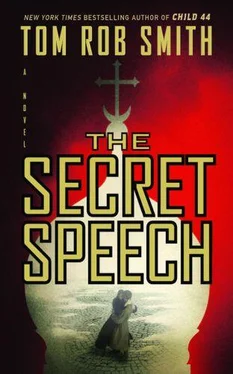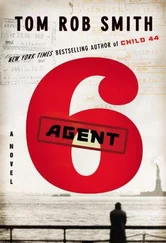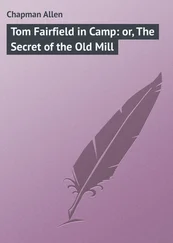Tom Smith - The Secret Speech
Здесь есть возможность читать онлайн «Tom Smith - The Secret Speech» весь текст электронной книги совершенно бесплатно (целиком полную версию без сокращений). В некоторых случаях можно слушать аудио, скачать через торрент в формате fb2 и присутствует краткое содержание. Жанр: Триллер, на английском языке. Описание произведения, (предисловие) а так же отзывы посетителей доступны на портале библиотеки ЛибКат.
- Название:The Secret Speech
- Автор:
- Жанр:
- Год:неизвестен
- ISBN:нет данных
- Рейтинг книги:5 / 5. Голосов: 1
-
Избранное:Добавить в избранное
- Отзывы:
-
Ваша оценка:
- 100
- 1
- 2
- 3
- 4
- 5
The Secret Speech: краткое содержание, описание и аннотация
Предлагаем к чтению аннотацию, описание, краткое содержание или предисловие (зависит от того, что написал сам автор книги «The Secret Speech»). Если вы не нашли необходимую информацию о книге — напишите в комментариях, мы постараемся отыскать её.
The Secret Speech — читать онлайн бесплатно полную книгу (весь текст) целиком
Ниже представлен текст книги, разбитый по страницам. Система сохранения места последней прочитанной страницы, позволяет с удобством читать онлайн бесплатно книгу «The Secret Speech», без необходимости каждый раз заново искать на чём Вы остановились. Поставьте закладку, и сможете в любой момент перейти на страницу, на которой закончили чтение.
Интервал:
Закладка:
Timur darted across the deck just as a wave began to sweep over the side, rushing toward him. He dived forward, grabbing the side of the turret and pushing the gun up into the air. Genrikh fired. The wave hit. For a split second Timur’s legs were lifted up. Had he not been holding on he would’ve been swept out to sea. The water cleared, his legs fell back down. With a mouth and nose full of salt water, Timur spluttered. Recovering, he grabbed hold of Genrikh by the scruff of the neck, losing control, furious, shaking him like a rag doll. He pushed him back, pulling the ammunition clip out of the gun and tossing it into the sea.
With the gun disarmed Timur staggered back toward the tower, checking the hatch as he passed. More rags were being stuffed into the holes. Almost at the tower, he felt the impact of another wave. Turning around, he saw water rushing at him. Smacked off his feet, he was pounded against the deck. Silence, all he could see was a million bubbles. Then the water drained from the deck, the sounds of the storm returned. He sat up, looking out. The machine-gun turret was gone: ripped out like a rotten tooth. The wreckage had been swept to the bow of the ship. Genrikh was caught up in the twisted steel.
Timur had enough slack in his cord to pull himself along the side and grab hold of the young guard. Pitiful, Genrikh tried to free himself from the metal. He was stuck. If the wreckage went overboard it would take him with it. Timur could save him. Yet he hadn’t moved. He glanced out at the sea. They were climbing another wave, soon they’d be plunging down, into the trough, and the force that had swept a bolted machine-gun turret off the deck would sweep them out too.
Turning his back on Genrikh, Timur took hold of the cord and pulled himself toward the tower. The ship’s angle reversed, plunging down. He reached the door, climbing inside, sealing it shut.
GENRIKH ROSE WITH A WAVE, splashing to keep afloat. The water was so cold he couldn’t feel anything below his waist. Washed overboard, there’d been intense pain when the steel had ripped him. Numb with shock, it was as if the icy waves had bitten him in half. For a second he saw the lights of the ship, and then it was gone.
TEN KILOMETERS NORTH OF MOSCOW
8 APRIL
ZOYA’S WRISTS AND ANKLES WERE BOUND with thin steel wire, coiled so tight that when she tried to adjust position it cut into her skin. She was blindfolded and gagged, lying on her side. There was no blanket underneath her — nothing to cushion the bumps in the road. Judging by the noise of the engine and the amount of space around her, she was in the back of a truck. She could feel the accelerations and vibrations through the steel floor. Each abrupt stop rolled her backward and then forward, more like a carcass than a living person. Once she’d recovered from the disorientation she began to visualize her journey. At the outset they’d made frequent turns, negotiating traffic. They’d been in a city — Moscow, although she couldn’t be sure of that. Right now they were traveling straight, at a constant speed. They must have left the city. Except for the truck’s gruff engine there was no other noise, no traffic. She was being taken somewhere remote. Based on this and the disregard for her safety — a rag stuffed so far down her throat she almost choked — she was certain that she was about to die.
How long had she been a captive? She had no way to know — the passing of time had become difficult to judge. After being snatched from the apartment she’d been drugged. Bundled into the car, she’d seen Raisa fall. That was the last thing she remembered before waking up, her head thumping, her mouth as dry as dust, sprawled on the floor of a windowless brick chamber. Even though she’d been unconscious when she’d been brought in, she’d had an acute sense that she was deep underground. The air was always cool and damp: the bricks never grew warm, giving no clue as to the cycles of day and night. The stench strongly suggested a sewer system. She’d often heard the sound of water. Sometimes the vibrations had been so strong it felt as if there were rivers rushing through adjacent tunnels. She’d been given food and bedding, her captors making no attempt to conceal their identities. They hadn’t spoken to her except for a series of curt commands and questions, showing little interest in her beyond the bare necessities of keeping her alive. Yet from time to time she’d been vaguely aware of someone watching her, hiding in the gloom of the corridor outside her cell. As soon as she moved closer, trying to catch a glimpse of them, they’d slip away into the darkness.
Over these past couple of weeks she’d thought about death, turning the subject over and over like sucking a boiled sweet. What exactly was she living for? She nurtured no dreams of being rescued. The idea of freedom did not bring tears of joy to her eyes. Freedom had been life as an unpopular, unhappy schoolgirl — hated and hateful. She felt no more alone in captivity than she had done in Leo’s home. She felt no more like a prisoner now than she had before. The setting had changed. Her captors had changed. Life was the same. She didn’t cry at the memory of her bedroom, or of a hot meal eaten together around the kitchen table. She didn’t even cry at the memory of her sister. Maybe Elena would be happier without her — maybe she was holding her little sister back, stopping her from leading a normal life and growing close to Leo and Raisa.
Why can’t I cry?
She’d pinch herself. But it was no good. She couldn’t cry.
She hoped Raisa had survived the fall. She hoped Elena was safe. Yet even these hopes, sincere though they were, felt detached, as if they were other people’s ideas of what she should be feeling rather than deeply held emotions. A crucial cog in her internal machinery was missing — instead of connecting emotions to experiences, wheels spun aimlessly. She should be afraid. But instead she felt as if she were floating in a bath of lukewarm resignation. If they wanted to kill her, they could. If they wanted to free her, they could. Bravado aside, it was honestly all the same to her.
THE TRUCK TURNED OFF THE FREEWAY, rattling over a dirt track. After some time, slowing down, it made several further turns before coming to a stop. The front doors opened and shut. Feet crunched across the ground, approaching the back. The tarpaulin was pulled aside. Like freight, Zoya was lifted up and placed on her feet, barely able to stand, the wire lashed around her ankles making it difficult to balance. The ground consisted of coarse mud and small stones. Queasy from the journey, she wondered if she was going to be sick. She didn’t want her captors thinking she was weak and afraid. Her gag was removed. She breathed deeply. A man began to laugh, condescending laughter, smug and deep and slow, as the steel wire was unwound and the blindfold was removed.
Zoya squinted at the daylight that seemed as bright as if she was only a hand’s length away from the surface of the sun. Like a subterranean ghoul caught outside its lair, she turned her back on the sky. Her eyes adjusting, the surroundings slowly came into focus. She was standing on a dirt track. In front of her, on the shoulder, were tiny white flowers, spread unevenly like splashes of spilled milk. Looking up, she saw woodland. Deprived of stimuli, her eyes behaved like a desiccated sponge dropped into water, widening, expanding — absorbing every drop of color before her.
Remembering her captors, she turned around. There were two of them — a squat man with thick arms and a thick neck, an oversized muscular torso. Everything about him was stout and squashed, as though he’d been grown in a box too small. In contrast, standing beside him was a boy, perhaps thirteen or fourteen years old, her age. He was lean and sinewy. His eyes were sly. He regarded her with open disdain, as if she were beneath him, as if he were an adult and she was nothing but a little girl. She disliked him intensely.
Читать дальшеИнтервал:
Закладка:
Похожие книги на «The Secret Speech»
Представляем Вашему вниманию похожие книги на «The Secret Speech» списком для выбора. Мы отобрали схожую по названию и смыслу литературу в надежде предоставить читателям больше вариантов отыскать новые, интересные, ещё непрочитанные произведения.
Обсуждение, отзывы о книге «The Secret Speech» и просто собственные мнения читателей. Оставьте ваши комментарии, напишите, что Вы думаете о произведении, его смысле или главных героях. Укажите что конкретно понравилось, а что нет, и почему Вы так считаете.












